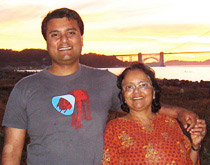
Anu Nigam (left: with his mother) laughs sheepishly when you say you've heard him called a serial entrepreneur. "Once you do one, you do another, and another," admits the Silicon Valley investor. "Start-ups are the little rebel alliance against the big empire. You try to be nimble. You try to grow and become big, and it's exciting. It's pie in the sky. Anything's possible."
This is something the Carnegie Mellon alumnus knows more than a little about. After the electrical and computer engineering major earned his degree in 1995, he started off on the leadership training track at Intel. But then he was invited to join a new venture called Cerent. It was not easy to leave the corporate comfort of Intel for the great unknown of a start-up, but he couldn't pass up the chance to help a company define itself. There were no tracks at Cerent, just uncharted territory.
In his new position, he was a chip designer. "Nothing big," he says. But he worked crazy hours and knew everything that was going on, which seems to be a prerequisite for anyone working at a start-up. When one of the company's managers didn't work out, sure enough, Nigam replaced him. "Here I was, 24 years old, managing 10 people who were older than me. And I had no clue," he says. "I had never managed people, never done anything of accomplishment. But I had this no-fear attitude."
His leap of faith turned out to be a savvy one. In 1999, Cerent was picked up by Cisco Systems for $7 billion. Nigam was next involved with another start-up, Siara Systems, which was sold to Redback Networks for $4.3 billion. Nigam was a mere 27 and worth "more than an immigrant's son could imagine." But not all the news was ideal.
"I was overweight, worked too hard, was probably a little socially inept," he says. He needed some time for himself. "I could probably have made more money by sticking around," he says. "But there's more things that matter."
He traveled around the United States and Europe, visited relatives in India, rode on a float at Mardi Gras, and even planned to write his memoirs while living in New York. Turns out he had a bit of writer's block. "Sometimes when you're successful at one thing, you think you can be successful at everything. That's not always the case," he says. "Being in the tech world and being smart about that doesn't mean you're the best writer of your own story."
In the end, the itch for the high-tech world came back. He's now CEO and founder of BuzzBox.com. Still in its early stages, the service acts as a filter that recommends news stories. The latest version is a mobile app that has been well received. Nigam is also board president of Sand Hill Angels, a group of 60 investors who pool money, networks, and resources. All told, he has invested in 40 start-ups. "I believe in the entrepreneur," he says.
That's not the only kind of investing Nigam is doing. He's a new board member of the Andrew Carnegie Society and has made a recent gift to the university funding an undergraduate scholarship. "Since my parents were immigrants, I know education was what let me get ahead," he says. "I know Carnegie Mellon can make a difference for a student. That's why I feel like my biggest impact is funding smart students. We need big ideas from them to solve all the problems out there."
-Sally Ann Flecker



